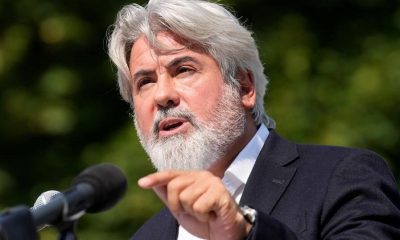TORONTO — North American stock markets plunged after a strong start to the week as a slide from Tesla Inc. and big tech company shares reversed a morning surge.
Optimism from Friday’s positive headlines about Gilead Sciences’s remdesivir carried over into Monday with news that the FDA granted fast-track designation to potential COVID-19 vaccines from Pfizer and a German company.
The tech-heavy Nasdaq composite surpassed 10,800 for the first time on gains from various companies including Facebook, Apple and Amazon while Tesla shares surged about 16 per cent.
The S&P 500 briefly erased all losses for the year.
However, market rallies evaporated in afternoon trading as Tesla reversed course and sank 3.1 per cent while the big tech companies were at least 1.7 per cent lower.
“The early optimism has faded,” said Erik Bregar, head of currency strategy at the Exchange Bank of Canada.
The electric car company featured more prominently in currency markets than is normal unless the movements are big enough, he said in an interview.
“I can point to the U.S. dollar rallying as soon as Tesla started tanking.”
Also a factor in the afternoon selloff was a rise in infection rates in California that prompted the state’s governor to roll back most reopening measures, including a statewide shutdown of bars, cinemas and dine-in restaurants.
The S&P/TSX composite index closed down 74.41 points at 15,639.41 after reaching an intraday high of 15,879.73.
In New York, the Dow Jones industrial average was up 10.50 points at 26,085.80 more than 550 points from its earlier high. The S&P 500 index was down 29.82 points at 3,155.22 after surpassing 3,235, while the Nasdaq composite was down 226.60 points or 2.1 per cent at 10,390.84.
The Canadian dollar traded for 73.71 cents US compared with 73.56 cents US on Friday.
Technology was the biggest mover on the TSX, losing 2.5 per cent as Shopify Inc. and Lightspeed POS Inc. were down 6.2 and 5.5 per cent respectively while Blackberry Ltd. was off 3.3 per cent.
Energy dropped on lower crude oil and natural gas prices with Seven Generations Energy Ltd. down 5.3 per cent and MEG Energy Corp. off 4.4 per cent.
The August crude contract was down 45 cents at US$40.10 per barrel and the August natural gas contract was down 6.6 cents at US$1.74 per mmBTU.
Materials dipped slightly despite higher metals prices with Oceanagold Corp. 8.3 per cent lower.
The August gold contract was up US$12.20 at US$1,814.10 an ounce and the September copper contract was up 5.75 cents at nearly US$2.96 a pound.
Health care rose on strong gains from Aphria Inc. while the heavyweight financials sector climbed with Manulife Financial and the Toronto-Dominion Bank up 1.9 and 1.4 per cent respectively.
Monday’s trading comes before the start of quarterly earnings results with large U.S. banks.
The results are expected to be dismal because of the impact of COVID-19, but if companies beat expectations that could produce positive surprises, said Bregar.
“That could probably give the stock market a lift and probably pressure the U.S. dollar a bit more.”
This report by The Canadian Press was first published July 13, 2020.
Companies in this story: (TSX:SHOP, TSX:LSPD, TSX:BB, TSX:VII, TSX:MEG, TSX:OGC, TSX:APHA, TSX:MFC, TSX:TD, TSX:GSPTSE, TSX:CADUSD=X)
Ross Marowits, The Canadian Press































